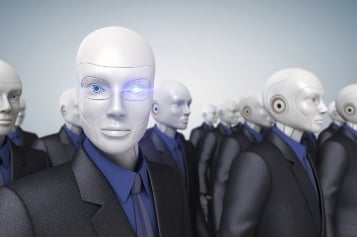Such is the nature of HR, that a lot of time can be taken up with time intensive processes and administrative practices. It used to be that HR was paper-based, full of filing cabinets and box-ticking surveys – but times have changed, and the function is continuing to evolve at a rapid rate.
The next evolution is here - Artificial Intelligence. “AI is already adding value to organizations who are on the cutting edge of adoption,” explained Susanne DiCocco, partner, Advisory Services
KPMG.
“We’ve been talking in HR about shifting from transactional to advisory services for over two decades. Artificial Intelligence or AI gives us the opportunity to fundamentally change what people do, using robotics process automation technology to complete highly repetitive, low variation transactions, allowing the talent we have to use their time more efficiently.”
And whilst this wave of new technologycan be used in almost any capacity, there are certain roles that seem to be more suited to the AI revolution – as DiCocco pointed out.
“We have a lot of manual, process-intense activities, that we don’t need to be doing. The role of a recruiter, for instance, is one which I’m very excited about. Currently a recruiter spends a significant amount of time going through CVs, looking up candidates online, checking LinkedIn, comparing skill sets, comparing CVs to job postings, collecting each piece of data and manually tracking and prioritizing candidates before the recruiter starts their valuable service of calling candidates and screening them. Everything before that important screening call can be replaced with ”bots”.
“We have bots that can scour the web and look for CVs, compile all the data, enter the information directly into the HRIS, pull into an excel sheet and prioritize the candidates based capabilities compared to the job postings. The recruiter can then take the list of candidates and begin the important human side of the process including the screeing interview looking for cultural fit and so on. Imagine the increased number of candidates a recruiter could talk to if they had the time to do so. Imagine the increased speed to find candidates.”
But with the world transcending to an increasingly automated way of life, we’ve heard rumblings from wary HR leaders who may find the shift in the zeitgeist unsettling. However, DiCocco firmly believes that HR practitioners should be looking at the opportunities of this and setting an example welcoming the digitisation with open arms.
“Leaders, especially in HR, need to embrace emerging technologies, not fear them,” she told us. “We need to look to see what the impact of the AI revolution will be, and how we can support our employees in making the shift to different job types, helping them to understand which of their skills need to be upgraded.
“Our organisations need to think outside the box in regards to ‘the possible’. Don’t be wary or fearful; this isn’t something that might happen this is something that is happening and will continue to happen. Make sure you don’t get left behind.”
To hear more on this topic, DiCocco will be speaking at our upcoming HR Leaders Summit West, on April 17th 2018 in Vancouver.
For more information on our speaker line up and exciting agenda, visit our registration page here.
Related stories:
$100M government grant: 1,500 new jobs expected at Linamar
Toronto among world’s best for start-up employees

